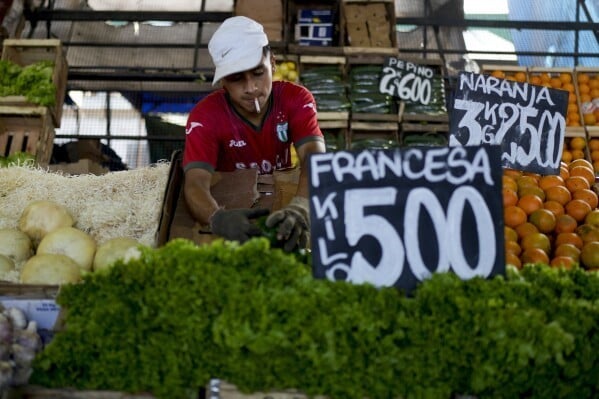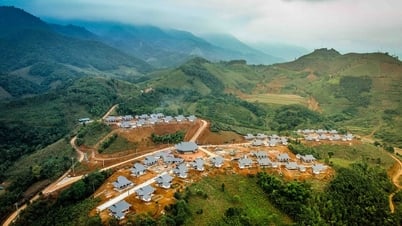While inflation in Argentina’s economy soared to 211.4% in 2023, the highest in 32 years, the country just received more bad news when the trade deficit last year reached 6.926 billion USD, due to a sharp decline in exports.
 |
| Not only is inflation 'hyperbolic', Argentina's economy continues to receive more bad news. (Source: AP) |
According to data released on January 18 by the National Institute of Statistics and Investigations of Argentina (INDEC), the annual inflation of the Argentine economy has skyrocketed to 211.4% in 2023, the highest level in 32 years.
The data reflects the dramatic impact of a series of shock measures, including a 50% devaluation of the national currency, implemented by right-wing President Javier Milei in the hope of finally controlling the South American country's rampant inflation.
That would put annual inflation at around 95% in 2022. Monthly inflation in the economy was 25.5% in December, up from 12.8% in November, but slightly below the 30% the government had forecast.
Meanwhile, the import turnover of South America's third largest economy reached 73.714 billion USD, down 9.6%, while exports reached 66.788 billion USD, down 24.5%.
The worst drought in a century has caused Argentina's exports of key agricultural products such as soybeans, corn and wheat to fall by up to 40%.
Argentina is the world’s third largest exporter of soybeans, but the largest exporter of soybean meal, cooking oil, and diesel fuel made from soybeans. Soybeans and soybean products are the country’s most important source of foreign exchange, accounting for nearly 30% of total exports in 2020. In 2022, this group of products will bring in more than $14.8 billion for Argentina.
Argentina is also the world's third largest corn exporter and the third largest corn importer of Vietnam. In addition, Argentina is also an important wheat producer in the world, but last year, the government restricted wheat exports to ensure food security.
Argentina's major trading partners include Brazil, the United States, China, Chile and Peru.
Source



![[Photo] General Secretary To Lam attends the conference to review 10 years of implementing Directive No. 05 of the Politburo and evaluate the results of implementing Regulation No. 09 of the Central Public Security Party Committee.](https://vphoto.vietnam.vn/thumb/1200x675/vietnam/resource/IMAGE/2025/5/19/2f44458c655a4403acd7929dbbfa5039)
![[Photo] Panorama of the Opening Ceremony of the 43rd Nhan Dan Newspaper National Table Tennis Championship](https://vphoto.vietnam.vn/thumb/1200x675/vietnam/resource/IMAGE/2025/5/19/5e22950340b941309280448198bcf1d9)
![[Photo] Close-up of Tang Long Bridge, Thu Duc City after repairing rutting](https://vphoto.vietnam.vn/thumb/1200x675/vietnam/resource/IMAGE/2025/5/19/086736d9d11f43198f5bd8d78df9bd41)
![[Photo] President Luong Cuong presents the 40-year Party membership badge to Chief of the Office of the President Le Khanh Hai](https://vphoto.vietnam.vn/thumb/1200x675/vietnam/resource/IMAGE/2025/5/19/a22bc55dd7bf4a2ab7e3958d32282c15)



































































![[VIDEO] - Enhancing the value of Quang Nam OCOP products through trade connections](https://vphoto.vietnam.vn/thumb/402x226/vietnam/resource/IMAGE/2025/5/17/5be5b5fff1f14914986fad159097a677)



Comment (0)